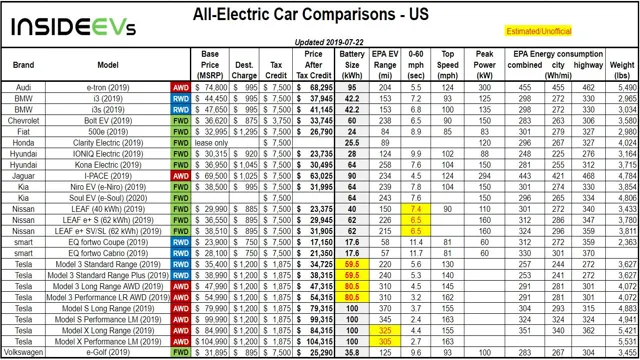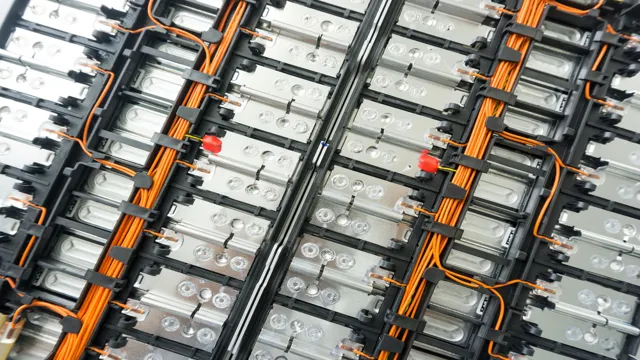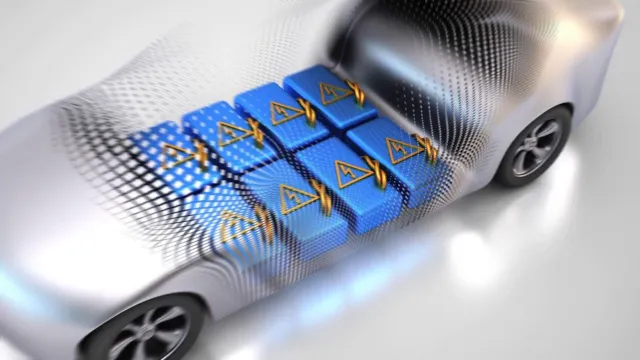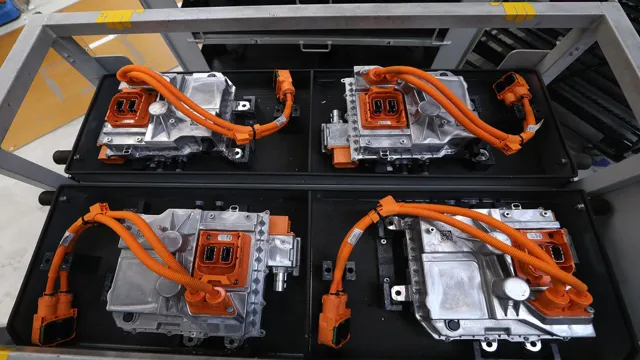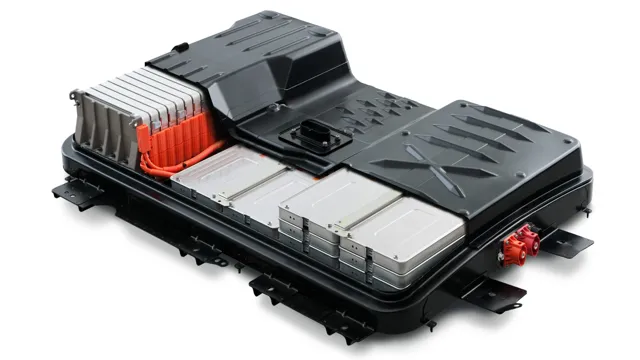Top Electric Car Battery Comparison: Finding the Best for Your Eco-Friendly Ride
Electric cars have been making waves in the automobile industry for quite some time now. But the attention has mostly been on their design, features, and the amount of power they can generate. However, one of the most crucial components that make an electric car run is the battery.
And while there are several types of electric car batteries available, it’s important to determine which one suits your needs best. Hence, this blog post will be focusing on electric car battery comparison. Electric car batteries are an essential part of an electric vehicle, contributing to its performance, maintenance, and durability.
There are several types of batteries, including Lithium-Ion, Nickel-Metal Hydride, Lead-Acid, and Solid State batteries. Each of them has its own set of pros and cons. This blog post delves into the features of each battery type, their advantages and disadvantages, so that you can make an informed decision when it comes to choosing the right one for your electric car.
Not only that, but this blog post will also cover various other aspects of electric car batteries, including their range, charging time, maintenance, and cost. We’ll explore how these factors differ based on the type of battery, the manufacturer, and other factors. By the end of this post, you’ll have a clear understanding of which battery is most suited for your needs.
Whether you’re a seasoned EV driver or a newbie, this blog post has something for everyone. So, buckle up and let’s compare electric car batteries to help you choose the right one for your electric vehicle.
Top Performing Electric Car Batteries
When it comes to electric car batteries, there are a few contenders for the top spot in terms of performance. One of the biggest names in the industry is Tesla, thanks to its cutting-edge technology and impressive range. The Tesla Model S, for example, has a range of over 400 miles on a single charge, which is significantly more than most other electric cars on the market.
Other top-performing electric car batteries include the Porsche Taycan, which boasts a range of up to 281 miles, and the Audi e-Tron, which can go up to 222 miles on a single charge. Of course, the exact range you’ll get will depend on a range of factors, including driving style and weather conditions. However, when it comes to electric car battery comparisons, these are some of the top contenders to keep in mind.
Tesla Model S
The Tesla Model S has set the bar high when it comes to electric car batteries. With its cutting-edge technology, the Model S boasts some of the top-performing batteries in the market. The Model S Long Range Plus can travel up to 402 miles on a single charge, making it a game-changer for electric vehicles.
Its battery has a total energy of 100 kWh and can charge up to 75 miles within just 5 minutes using the Tesla supercharger network. This is a considerable improvement compared to previous versions of the Model S, which typically achieved 350 miles per charge. Tesla has continued to innovate and improve the performance of their batteries, with rumors of an even more powerful battery on the horizon.
With the Tesla Model S leading the way, it’s safe to say that electric cars are quickly becoming a more practical and reliable option for drivers who want to reduce their carbon footprint and save money in the long run.
Chevrolet Bolt EV
The Chevrolet Bolt EV is undoubtedly one of the top electric vehicles on the market today, and its battery performance is a significant factor in its popularity. The Bolt EV features a 60-kWh lithium-ion battery pack that provides an EPA-rated range of up to 259 miles on a single charge, making it one of the longest-range electric vehicles available. Furthermore, the Bolt’s battery can charge to 80% capacity within an hour with a DC fast charger.
The Bolt’s battery is also incredibly durable, as evidenced by its 8-year/100,000-mile warranty. Overall, the Chevrolet Bolt EV’s battery performance is a standout feature, making it one of the best electric vehicles on the market today.
Nissan Leaf
As electric cars become more popular, the performance of their batteries becomes increasingly important. The Nissan Leaf is one of the top-performing electric cars on the market, and its battery is a large part of its success. The Leaf’s battery boasts 30 kWh of power, giving it a range of up to 107 miles on a single charge.
Additionally, the battery is designed to last for over 10 years, making it a cost-effective choice for environmentally conscious drivers. The Leaf also has a feature called “Vehicle-to-Grid,” which allows it to discharge energy back into the power grid during peak usage times. Overall, the Nissan Leaf’s battery is a standout feature and a major reason why it has become one of the most popular electric cars on the road today.
Battery Range Comparison
When comparing electric car batteries, the range is a critical factor that needs consideration. Battery range is the distance that an electric car can cover on a single charge. The range varies significantly depending on different factors such as battery size, vehicle weight, driving style, and temperature.
For instance, the Tesla Model S Long Range version has a range of up to 402 miles, while the Nissan LEAF has a range of 150 miles. Besides, factors such as constant use of air conditioning or driving at high speeds can also impact the battery range. Therefore, when planning your next trip with an electric car, it’s vital to factor in the estimated driving distance and any charging stations along the way to avoid battery depletion.
Overall, electric car battery comparison should prioritize range capacity to ensure convenience and a positive driving experience.
Tesla Model S – 370 miles
The Tesla Model S boasts an impressive battery range of 370 miles, making it a top performer in the electric car market. But how does it compare to other electric vehicles on the market today? Well, it definitely holds its own. In fact, according to recent studies, the Tesla Model S ranks as one of the top electric cars in terms of battery range.
It’s important to note that battery range can vary depending on driving conditions, but the Model S has proven to be a reliable and efficient option for those looking to make the switch to electric. With its sleek design and impressive capabilities, it’s no wonder Tesla has garnered a loyal following. Whether you’re looking to make a statement or simply reduce your carbon footprint, the Tesla Model S is definitely worth considering.
So why not take one out for a test drive today? Who knows, you might just fall in love with the future of automotive technology.
Chevrolet Bolt EV – 259 miles
If you’re in the market for an electric vehicle and range anxiety is a major concern for you, then the Chevrolet Bolt EV might be the perfect car for you. With a range of 259 miles on a full charge, it beats out many of its competitors when it comes to battery range. The Bolt EV offers a comfortable drive, spacious interior, and cutting-edge technology.
Plus, it’s eco-friendly and can save you money in the long run by eliminating the need for gas. But keep in mind that while the Bolt EV has an impressive range, it’s still important to plan your trips accordingly and make use of charging stations when necessary. Overall, if you’re looking for a reliable, environmentally friendly car that won’t leave you stranded, the Chevrolet Bolt EV is definitely worth considering.
Nissan Leaf – 150 miles
When it comes to battery range comparisons, the Nissan Leaf is a hot topic, especially with its impressive 150-mile range. This all-electric vehicle is equipped with a 40 kWh battery, which can take you on extended drives without stopping for a charge. Although there are some competing vehicles on the market, the Nissan Leaf stands out with its sleek design and comfortable interior.
Not to mention, you’ll be doing your part for the environment, as the Leaf produces zero emissions. So if you’re looking for a spacious and eco-friendly ride that won’t disappoint in terms of battery range, the Nissan Leaf is definitely worth considering.
Charging Speed Comparison
When it comes to electric car battery comparison, the charging speed is a crucial factor to consider. Charging time can vary depending on the battery’s capacity, the size of the charging station, and the amount of power it can deliver. For instance, some electric cars can be charged in as little as 30 minutes using a high-power DC fast charger, while others may take hours.
It’s important to choose a car with a battery and charging system that can fit your lifestyle and needs. You don’t want to end up stuck next to a charging station for hours or unable to complete a long trip due to limited charging capabilities. Overall, fast charging can be a game-changer for electric vehicle owners, providing greater convenience and flexibility.
Tesla Model S – 45 minutes for 80% charge
When it comes to charging speed, the Tesla Model S is a real winner. In just 45 minutes, this electric vehicle can charge up to 80%. This is faster than most other EV models on the market, making it a great choice for those who need to quickly top up their battery on the go.
The Model S comes with a variety of charging options, including a home charging station, a Supercharger network, and other public charging stations. With the Supercharger network, you can get up to 170 miles of range in just 30 minutes. That’s pretty impressive! If you’re looking for a fast-charging electric car, the Tesla Model S is definitely worth considering.
Chevrolet Bolt EV – 30 minutes for 90 miles of driving
The Chevrolet Bolt EV is an impressive electric vehicle that can quickly charge up to 90 miles of driving in just 30 minutes. That’s the equivalent of a half-hour lunch break! Compared to other EV models, the Bolt’s charging speed is a notable standout. It’s incredibly convenient for those who need to recharge their battery quickly and efficiently.
Plus, the Bolt has a long-range capability of up to 259 miles per full charge. So, even if you’re taking a longer trip, you can feel confident in the Bolt’s ability to keep up with your driving needs. Overall, the Chevrolet Bolt EV is an excellent choice for anyone looking for an electric vehicle with fast charging speeds and a long-range capability.
Battery Life Expectancy Comparison
When it comes to electric car battery comparison, the first thing to consider is battery life expectancy. This refers to the length of time the battery can operate before it needs to be replaced. The battery life expectancy of electric cars varies depending on the manufacturer, model, and driving style.
For example, some electric car batteries can last up to 300,000 miles or more, while others may only last 100,000 miles. It’s important to note that battery life expectancy can also be affected by factors such as temperature and charging habits. Overall, the lifespan of an electric car battery is improving each year as technology advances, making electric vehicles a more reliable and sustainable option for the future.
Conclusion
In conclusion, when it comes to electric car batteries, there are a lot of factors to consider. It’s not just about range, but also about charging time, cost, and environmental impact. Just like choosing a partner, you want to find the right balance and compatibility.
So whether you go with a traditional Li-ion battery or something more exotic like a solid-state battery, just remember that it’s all about finding that electric connection.”
FAQs
What are the top electric car batteries on the market for comparison?
Some of the top electric car batteries for comparison include the Tesla Model S, the Chevrolet Bolt, the Nissan Leaf, and the BMW i3.
What factors should I consider when comparing electric car batteries?
Some important factors to consider when comparing electric car batteries include range, charging time, overall lifespan and durability, cost, and the availability of charging stations.
Which electric car battery provides the longest range?
Currently, the Tesla Model S holds the record for the longest range of any electric car battery at 402 miles on a single charge.
How does the cost of electric car batteries compare to traditional gasoline-powered cars?
Electric car batteries can cost significantly more upfront than traditional gasoline-powered cars, but they typically have lower ongoing costs due to their lower maintenance and fuel costs. However, this can vary based on factors such as the specific make and model of the car, where the owner lives, and the cost of electricity in their area.
